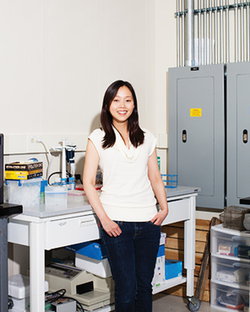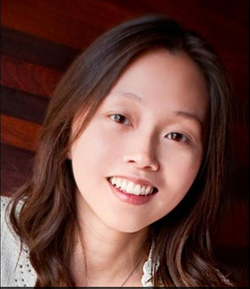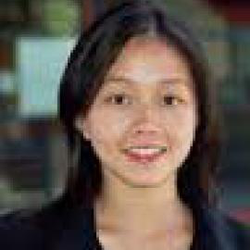Christina Fan

Christina Fan
Dr. Christina Fan is a Biomedical engineer from Hong Kong who is best known for her graduate work in developing a DNA sequencing technique and algorithm that allows non-invasive pre-natal testing for Downs syndrome. [0]She completed her undergraduate studies at Columbia University and received her MSc. and PhD. in Bioengineering from Stanford University. She has previously worked as an intern at Fluidigm and served as the Director of Technology Development at ImmuMetrix LLC. Dr. Fan currently works at BD Genomics, a start-up aimed at understanding the human immune system using next-generation technologies, as the Applications Team Lead. [1]
Personal Life
Fan was born in Hong Kong into a family of doctors, which is where she says her interest in medicine stems from. She attended St. Stephen's Girls' College in Hong Kong for high school. Although she comes from a family of doctors, Fan "prefers working behind the scenes developing diagnostic tools that assist doctors in helping their patients". She is also a world traveler, having visited all seven continents, and is an orchestral flautist and pianist. [4]
Academia
As a graduate bio-engineering student in Stanford, Fan developed a "revolutionary testing method that utilizes a blood sample rather than inserting a needle into the mother's womb".
[4]This test is able to detect the presence of excess chromosome 21 in a mother's blood sample by using an algorithm that estimates the amount of certain chromosomes that should be present if the fetus contributes the correct number of chromosomes.
Fan's new method was ranked as one of the Top 10 Medical Breakthroughs of 2008 in TIME Magazine and is now widely used as a commercial prenatal screening test for genetic diseases. [5]She later expanded her work to look at the genes associated with other inherited conditions by adapting her technique to build the entire inherited fetal genome from maternal blood. Fan's graduate work also included the development of microfluidic devices for the physical separation of chromosomes for whole-genome haplotyping of a human individual, for which she received TR10 recognition by the MIT Technology Review.
Awards and honors
2012, Forbes 30 Under 30 (Science & Healthcare) [2]
2012, MIT Technology Review TR35
2011, Postdoctoral Fellow- Lawrence Berkeley National Lab
2011, Forbes 30 under 30 (Science & Innovation) [3]
2011, MIT Technology Review TR10
2009-2010, Siebel Scholarship-Thomas and Stacey Siebel Foundation
2005-2008, Stanford Graduate Fellowship (SGF)-Stanford University
2005, Salutatorian-School of Engineering and Applied Science, Columbia University
2005, George Vincent Wendell Memorial Medal-School of Engineering and Applied Science, Columbia University
2005, Richard Skalak Memorial Prize-Department of Biomedical Engineering, School of Engineering and Applied Science, Columbia University, 2005
2004-2005, Tau Beta Pi Scholarship (Elsa & Peter Soderberg Scholar No. 6), Tau Beta Pi


